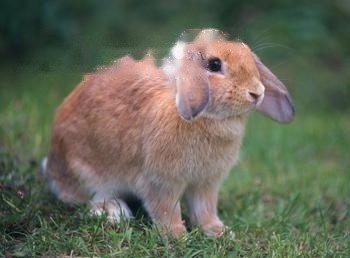
American Mini Lop
American Mini Lop Rabbit, also commonly known as Binny lop, small lop or pygmy lop.
English name: Standard Chinchilla
Standard Chinchilla, alias Scroll Rabbit; English name Standard Chinchilla. Weight: 5-7.5kg, short body, flat head, erect ears and length less than 12cm. The standard Chinchilla rabbit is named for its fur that closely resembles the precious small animal Chinchilla lanigera produced in South America. The base of the hair is dark gray-blue, the middle part gradually becomes light gray, and the tip of the hair is black. Chinese Name : Standard Chinchilla
Common Name Alias: Scroll Rabbit
English Name: Standard Chinchilla
Reproduction: Viviparous
Habits: docile and obedient, know how to recognize people, be considerate and close to people, but also have strong self-esteem.
Physical characteristics Weight: 5-7.5kg Short body, flat head, erect ears and length less than 12cm. The standard Chinchilla rabbit is named for its fur that closely resembles the precious small animal Chinchilla lanigera produced in South America. The base of the hair is dark gray-blue, the middle part gradually becomes light gray, and the tip of the hair is black.
Food: Grass-fed
Certified Association: American Rabbit Breeders Association (ARBA)
The character is docile and obedient, know how to recognize people, be considerate and close to people, but also have strong self-esteem.
Jinjira Rabbit's big ears, fat body, and silver-gray fur make people reminiscent of the cute My Neighbor Totoro, this is actually a cute rabbit, but there is still a big difference from chinchillas. Jinjira rabbits are much bigger than chinchillas.
Standard Chinchilla is short, The head is relatively flat, with erect ears and a length of less than 12cm. The standard Chinchilla Rabbit is named for its fur that closely resembles the precious small animal Chinchillalanigera produced in South America. The base of the hair is dark gray-blue, the middle part gradually becomes light gray, and the tip of the hair is black. pet rabbits to raise, as time goes by, the biggest change of Jinjira rabbit is that its body shape starts to grow longer, Then the ears start to get bigger, and slowly you will find that the rear of the Jinjira rabbit is getting more and more plump, the whole body is cylindrical, the tail of the Jinjila rabbit is short, and the color of the tail is half gray and half white.
The most important part of choosing a rabbit cage for Chinchilla rabbits is choosing a suitable bottom plate . The bottom plate is in direct contact with the soles of the rabbit's feet, rabbit only has fur on the soles of its feet , There are no stone pads like cats and dogs, so unreasonable pads will cause Jinjira rabbits (details) to suffer from foot dermatitis.
I. How about the bamboo backing board?
There are some special bamboo cage bottoms on the Internet. Compared with metal bottom nets, bamboo cage bottoms are safer. And easy to scrub, but bamboo cage bottoms are not suitable for pets rabbits, the main reason The fibers on the bamboo poles are hard and sharp, which are easy to be bitten by the Jinjila rabbit and hurt the mouth of the Jinjila rabbit during use. Therefore, it is best not to choose bamboo bottom plates when raising pet Jinjira rabbits.
Second, can the wooden backing plate work?
What about the wooden cage bottom plate? Professional pet rabbit cages generally have matching wooden cage bottom plates, while professional wooden cage bottom plates The surface is mechanically sanded without protruding wood thorns. The natural wood material can be bitten by the Chinchilla rabbit without causing harm to the body of the Chinchilla rabbit.
Third, the best choice is plastic.
The plastic cage bottom plate is the most expensive one among the bottom plates. Most of the ones equipped with plastic cage bottom plates are high-grade rabbit cages. The plastic used is relatively thick resin plastic, which is very comfortable for Jinjira Rabbit to step on. The staggered design can spread the pressure and will not collapse like a metal bottom mesh.
When many owners raise Chinchilla rabbits, they will eat whatever they think of, and do this There will be no problems in a short period of time, but in the long run, the rabbit will definitely have an outbreak of digestive tract disease. So, what kind of food is suitable for Chinchilla rabbits?
1. Special rabbit food is the main one.
It is not easy to prepare enough nutritious vegetables for Chinchilla rabbits every day. Therefore, it is more convenient to buy ready-made special rabbit food for feeding. The nutritional formula in the special rabbit food is very comprehensive, as long as some green grass, vegetables and fruits are added appropriately. Most of the special rabbit food contains substances with deodorizing function, so that your Chinchilla rabbit will not feel any odor even if it is kept in the bedroom. In addition, there are also special hard foods for rabbit to grind their teeth. Prevents rabbit teeth from growing too long.
Second, supplemented by vegetables and fruits
1. Vegetables: carrots, sweet potatoes, cabbage (cabbage), cucumbers, radish leaves, pumpkins, green vegetables. When feeding vegetables, they must be washed and drained before feeding.
2. Fruits: oranges, bananas, grapes, apples, strawberries. When feeding fruit, the rabbit's water intake should be appropriately reduced to regulate water absorption.
3. Grass: shepherd's purse, plantain, dandelion, goose sausage.
4. Other food: bean curd residue, bread.
3. Food taboos for Jinjila rabbits
1. Foods that should be paid attention to: If corn and peanuts are not fresh, it is easy to produce a toxic substance of Aspergillus flavus, so they can only be fed to its fresh. In addition, potato sprouts contain toxins, so special care should be taken.
2. Foods that cannot be fed: irritating vegetables such as onions, leeks, garlic, etc. should not be fed to rabbits. Also, chocolate is prone to food poisoning, so feeding it should be absolutely avoided.